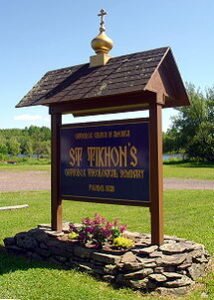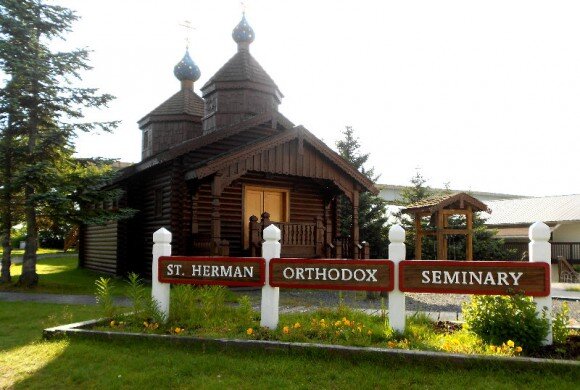“On Earth as in Heaven” Conferences
OFT facilitates conferences and workshops on Orthodox Christian Transfiguration of Creation.
Find out about our past conferences in Alaska and Pennsylvania..

“Orthodox Spiritual Life and the Environment”
April 16-17, 2010. St. Tikhon’s Orthodox Seminary, Pennsylv
The conference also included a shortened one day version of the Christ in the Wilderness program on the monastery grounds, led by OFT Executive Director Fred Krueger.
Presentations:
- Igumen Sergius Bowyer, “Monasticism and the Renewal of Creation”
- Prof. Bruce (Seraphim) Foltz, “Nature and Other Modern Idolatries”
- Father Andrew Damick, “Cosmic Cathedral: Orthodox Liturgy and Ecological Vision”
- Protodeacon Sergei Kapral, “The Orthodox Church and Non-Orthodox Eco-Justice Movements”
- Prof. Alfred (Kentigern Pavlos) Siewers, “The Desert Sea: Early Irish Ascetic Landscapes of Creation”
- Dr. Elizabeth Theokritoff, “Environmental Concerns and Orthodox Christian Witness”

St. Herman’s Orthodox Seminary in Kodiak, Alaska
May 26-27 St. Herman of Alaska Orthodox Seminary
“Saint Herman Seminary has placed an emphasis on Orthodoxy and ecological interests for the last five years,” declared Seminary Dean Father Chad Hatfield as he opened the conference with prayer and comments on the importance of an Orthodox respect for creation.
“The Orthodox Church has always acknowledged responsibility to take good care of God’s earth,” declared Fred Krueger, OFT executive director from Santa Rosa, California. “From a dozen perspectives, we repeatedly discern a duty to transfigure God’s creation.” Jesus Christ demonstrates it; the Scriptures mandate it; and the Fathers teach it. Our patriarchs and hierarchs call for it; the modern context with its rampant pollution necessitates it; and the Orthodox “pro-life principle” implies it. Spiritual striving embraces it; the Orthodox vision of the Holy Spirit “everywhere present” presumes it; and missionary sensitivity cultivates it. Further, young people intuit it; the Divine Liturgy epitomizes it; and salvation requires it.” (cf. Rev. 11:18).
Anne Glynn Mackoul, a member of the OFT steering committee from Princeton, NJ, presented the ecological vision of His Beatitude Patriarch Ignatius IV of Antioch. Ms. Glynn Mackoul highlighted His Beatitude’s call for recovery, with a view to the transfiguration of nature, the three traditional forms of asceticism: fasting, vigilance and charity. Each has important ecological relevance. “The spirit of fasting,” she related, quoting from His Beatitude, “should be diffused throughout the whole of our civilization.” Fasting, declares His Beatitude, “cultivates a change from an exploitive relationship with nature to one modeled on the Eucharist.”
Other words cited from His Beatitude: “Tradition tells us that fasting is inseparable from mercy and sharing. The Fathers have underlined that physical matter passes continuously from one body to another, and thus the universe is a single interconnected body – that of humanity. That is why, for them, the earth belongs only to God. Humans are only its managers, and the consequences of human activity, in a prolongation of eucharistic sharing and in a spirit of fasting, should be the subject of a beneficent circulation; that is, a just distribution. A cosmology of transfiguration is thus inseparable from a sociology of communion, even though this has to be continuously invented anew in the changing circumstances of history.” Vigilance helps us “to resist the idolatries which close our eyes to the truth of things and to inaugurate between man and the world a relationship in which each embraces the other… Vigilance also makes us attentive to the beauty of things which is certainly something precarious, but through which appears the Resurrected One in whom all is alive forever…. Vigilance goes further and teaches us to look at the world in the light of the icon…Charity seeks to transform the cosmic life which flows through us…”
Joseph Marino, a business leader, solar power authority and member of Saint Seraphim of Sarov Orthodox Church in Santa Rosa, California, addressed the topic of climate change and Orthodoxy. He recommended a series of actions which the seminary might take to do its part in regard to climate change and at the same time establish local leadership in responding to this multi-sided dilemma. “The installation of solar or wind power,” he said, would outlast the lives of those now here and continue to return benefits to the seminary for many decades. These renewable energy systems will resist our tendency to depend on fossil fuels and save the seminary money over the long term. A solar system not only saves money, it is more convenient. It also teaches us how to become more conservation minded because the focus on energy alerts us to our behavior in such a way that we respect and conserve what we develop through the free energy that is available through a right relationship to God’s creation.
Other conference themes included “The Bible as an Ecological Handbook,” the moral and ethical implications of climate change, and “nature as our best teacher,” a theme taken from the writing of Saint John Chrysostom.
“The Ecology Retreat was a perfect way to expand a better theological understanding of Orthodoxy and the environment,” declared Fr. Chad after the conference. “But it was also an apologia for the Native Alaskan Orthodox people who are working to be the Orthodox voice in a state where many activists believe that Christianity is anti-environmental.”
Read the Conference Report of this event.
Conference Papers
- On Earth as It Is in Heaven: Putting Orthodox Theology and Ecology into Action
Keynote Address by His Eminence Archbishop Demetrios
November 11, 2013. Washington, DC - The Ascetic Imperative
Elizabeth Theokritoff
November 11, 2013. Washington, DC - The Ecological Steward
Andrew Stoiko
November 11, 2013. Washington, DC - Conference Report: On Earth as It Is Heaven
Alexander Patico
November 11, 2013. Washington, DC - Conference Report: St. Tikhon’s Seminary Hosts Conference on Orthodox Spiritual Life and the Environment
2010. OFT Newsletter. - Lessons from the Desert Fathers for Today
Fr. Athanasius Shaw
Portland, Oregon
